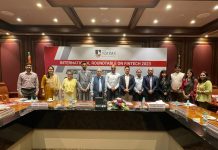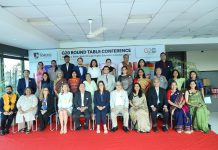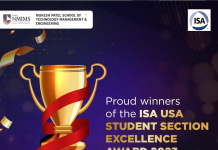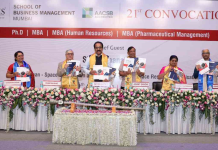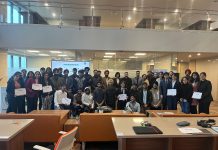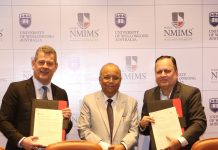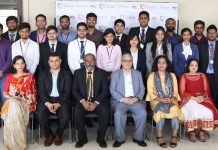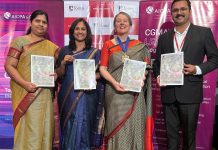SVKM’s NMIMS organized the 10th book talk on “The Made in India Manager” with – Mr. R. Gopalakrishnan, Author and Corporate Advisor, Executive in Residence, SP Jain Institute of Management & Research, Distinguished Professor, IIT Kharagpur and Dr. Ranjan Banerjee, Dean and Professor, BITS School of Management on 25th November 2021.
Mumbai 25th November, 2021: In his interaction, Mr. R. Gopalakrishnan drew a parallel between India and China- India is good at soft skills while China was always good in the manufacturing sector. He said Enterprise business management is the next big thing that will be exported from India. He talked about Indianising business management and that we’ve a long tradition of ‘I’sation. He highlighted ‘I’sation goes back to when government exams were democratized. R. Gopalakrishnan also discussed about the 7S framework of management which holds the seven internal aspects of any company that works in tandem for assured success of an organization. He pointed out that trust is more important in competitive platform.
Dr. Ranjan Banerjee talked about how Indian Managers benefit from living their formative years in India, which stands them in good stead on global platform. We are used to living in ambiguity, which helps us adapt fast to the situation. He gave an interesting example of how retail stores in the USA cannot calculate giving out change if you give them extra money, unlike an Indian ‘Kirana’ store owner who calculates the change to be given back quickly using mental maths.
Dr. Banerjee also talked about family values belong a key driver for the Indian manager and we have faced competitive intensity throughout our lives. Inclusion and diversity enables a Made in India Manager to adapt quickly to changing scenarios and take up challenging roles. An Indian manager speaks an average of 4 languages which adds to his diversity. Dr Banerjee strongly believe today’s millennials will be global managers tomorrow.
During the interactive Q&A- session Mr. Gopalakrishnan elaborated on how different communities have spread out and built business enterprises and the common thread he observed is that they nurtured human talent and threw challenges at them.
Dr. Sahajanand Kamat, Assistant Professor, MPSTME Civil Engineering Department, Mumbai NMIMS and Ms. Saitejasvi Deshmukh, 4th year MBA Technology Management student, MPSTME, NMIMS, moderated the session.
To Watch session : https://www.facebook.com/NMIMS.India/videos/4448524241891238
About SVKM’s NMIMS University:
Established in 1981, NMIMS is today recognized as a globally reputed university with strong industry linkages. It offers multiple disciplines across 8 campuses that consist of 17 specialized schools, more than 17000 students, and about 750 full-time faculty members, 10 faculty members with Fulbright Scholarship and Humboldt International Scholarship for post-doctoral researchers. It is known for its consistent academic quality and research-focused approach towards holistic education. SVKM’s NMIMS has been granted Category-I Deemed University status by Graded Autonomy Regulation 2018 by MHRD/UGC and NMIMS Mumbai Campus is NAAC accredited with a CGPA of 3.59.
Website: www.nmims.edu
About the Book:
Over the last fifty years, several Indians have occupied top positions in multinationals across the globe. Shantanu Narayen at Adobe, Satya Nadella at Microsoft, Padmasree Warrier at NIO, and Sundar Pichai at Google- there are innumerable instances of CEOs born and grew today in India, helming S&P’s 500 companies. What accounts for such a prominent presence of Indian professionals across the world today?
In The Made-in-India Manager, two stalwarts of Indian business and academics examine this little-studied phenomenon and present a compelling argument: that a unique combination of factors has led Indian management thought and practices to become a ‘soft power’ with the potential to decisively impact global managers of tomorrow.
Drawing on their long and varied experience among corporates, the authors explore
- The deep cultural influences that engender a sharp competitive instinct and an astute business perspective;
- The circumstances that inspire a high degree of resourcefulness in challenging situations;
- The ability to ‘think in English and act in Indian’, which enables flexible functioning in multicultural work environments;
- And, importantly, how today’s young managers can build on these advantages and bring to the table their own generational learning, attitudes and capabilities to ensure future success.




